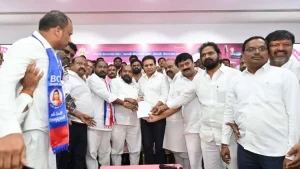Telangana witnessed an unprecedented statewide bandh on October 18, 2025, marking a historic moment in the state’s pursuit of social justice. The strike, called by the Backwards Classes Joint Action Committee (BC JAC), demanded the implementation of 42 per cent reservation for Backwards Classes in local body elections, education, employment, and governance. What made this movement remarkable was the rare political consensus it achieved, with the ruling Congress, opposition BRS, BJP, and left parties standing together for the cause of Telangana BC reservation.
 Also Read: Telangana BC Reservation: Powerful Statewide Bandh Demands Justice
Also Read: Telangana BC Reservation: Powerful Statewide Bandh Demands Justice
Other: Bold Claim on “Easy Solution”?
The bandh brought normal life to a standstill across all 31 districts, with schools, colleges, markets, and transport services significantly affected. This collective action represented more than a political protest; it symbolised the aspirations of communities constituting over 56 per cent of the state’s population who have historically remained underrepresented in political decision-making processes.
The Genesis: Understanding the Telangana BC Reservation Demand
The demand for enhanced Telangana BC reservation is rooted in comprehensive empirical data and constitutional principles. In 2024, the Telangana government conducted an extensive Socio-Economic, Educational, Employment, Political, and Caste (SEEECPC) Survey covering 96.9 per cent of households and over 35 million individuals. This landmark survey revealed that Backwards Classes constitute 56.33 per cent of Telangana’s population, yet their political representation in local bodies remained disproportionately low under the existing 25 per cent reservation framework.
Based on these findings, a Dedicated BC Commission headed by retired IAS officer Busani Venkateshwara Rao was established in November 2024. The commission submitted its report in March 2025, recommending at least 42 per cent reservation for BCs in political representation, particularly in local bodies. This recommendation formed the constitutional and empirical foundation for the government’s subsequent policy decision to enhance Telangana BC reservation from 2 per cent to 42 per cent in rural and urban local bodies.
On September 26, 2025, the Telangana government issued Government Order No. 9 (GO 9), officially granting a 42 per cent Telangana BC reservation in local body elections. This decision was preceded by legislative amendments passed in August 2025, which removed the existing 50 per cent ceiling on reservations specifically for local bodies, clearing the pathway for enhanced BC representation.
The Judicial Roadblock: High Court Stay and Supreme Court Verdict
The implementation of the 42 per cent Telangana BC reservation faced immediate legal challenges. Petitioners argued that the enhanced quota would push total reservations in the state to 67 per cent—including 15 per cent for Scheduled Castes, 10 per cent for Scheduled Tribes, and 42 per cent for Backwards Classes—thereby breaching the Supreme Court’s established 5 per cent ceiling set in the landmark Indra Sawhney judgment.
On October 9, 2025, the Telangana High Court issued an interim stay on GO 9, suspending the implementation of the percentage Telangana BC reservation. The bench, comprising Chief Justice Aparesh Kumar Singh and Justice G.M. Mohiuddin, directed the state government to file a counter-affidavit within four weeks and granted petitioners two weeks to respond thereafter. The court questioned the timing of the order, issued after election notifications were released, and raised concerns about the constitutional validity of exceeding the per cent reservation ceiling.
The Telangana government immediately challenged this stay order in the Supreme Court, filing a Special Leave Petition (SLP) on October 14, 2025. The state argued that the Constitution does not explicitly prescribe per percentage ceiling on reservations and cited the Supreme Court’s ruling in the K. Krishna Murthy case, which held that this limit could be crossed if supported by empirical data. The government emphasised that it had satisfied the “triple test” mandated for granting reservations in local body elections through comprehensive surveys and commission recommendations.
However, on October 16, 2025, the Supreme Court bench of Justices Vikram Nath and Sandeep Mehta dismissed the Telangana government’s petition, dealing a significant setback to the implementation of the 42 per cent Telangana BC reservation. The Court observed that the High Court should be allowed to decide the case on its merits and clarified that the dismissal would not prejudice the ongoing proceedings before the lower court.
 Political Consensus: Rare Unity Across Party Lines
Political Consensus: Rare Unity Across Party Lines
The movement for Telangana BC reservation achieved something extraordinary in contemporary Indian politics—complete unity across the political spectrum. The ruling Congress party, under Chief Minister A. Revanth Reddy declared full support for the bandh. Telangana Pradesh Congress Committee (TPCC) president Mahesh Kumar Goud emphasised that the Congress government had sincere and committed intentions to ensure 42 per cent reservations for BCs criticised the BJP-led central government for allegedly blocking the necessary constitutional amendments.
The opposition BRS (Bharat Rashtra Samithi) party extended wholehearted support, with working president K.T. Rama Rao stating that if the INDIA and NDA alliances cooperated, the Telangana BC reservation Bill could be passed into law without delay. The BJP, despite facing criticism for central government inaction, supported the bandh through its MP and BC JAC Chairman R. Krishnaiah, who has been instrumental in mobilising political parties and social groups for the cause.
Left parties, including CPI (ML) New Democracy, IFTU, and Civil Liberties Committee, expressed full solidarity with the BC JAC’s bandh call. Smaller parties like Telangana Rajyadhikara Party led by Teenmar Mallana and Kalvakuntla Kavitha also joined the movement, creating an unprecedented political coalition centred on social justice.
Ground-Level Impact: A State Comes to a Standstill
The October 18 bandh had a widespread impact across Telangana. Schools and colleges, both government and private, remained closed, though most educational institutions were already observing Diwali holidays. Government offices officially remained open, but several operated with minimal staff. State-run RTC buses operated on reduced schedules, causing inconvenience to daily commuters, though the extent of taxi and auto-rickshaw participation remained unclear.
Markets and shops, particularly in cities like Hyderabad, Warangal, Karimnagar, and Nizamabad, witnessed shutdowns with merchants’ associations extending cooperation to the BC cause. Essential services, including hospitals, police, hotels, and emergency facilities, continued normal operations. The Telangana Director General of Police B. Shivadhar Reddy urged organisers to conduct the bandh peacefully and warned that any illegal activity would face strict action.
In Jogulamba Gadwal district, various caste associations, including the Gadwal District Yadava Sanga, have announced complete support. District leaders appealed to BC communities to stand united in defence of their constitutional rights and demanded that the 42 per cent Telangana BC reservation policy be implemented through a oconstitutionalamendment by including it in the Ninth Schedule, thereby making it legally enforceable and immune from judicial review.
The Constitutional Debate: Exceeding the 50 Per cent Ceiling
The controversy surrounding Telangana BC reservation centres on fundamental constitutional questions about the limits of affirmative action. The Supreme Court’s Indra Sawhney judgment established a 50 per cent ceiling on reservations as a general principle to maintain a balance between social justice and merit-based selection. However, the Court also acknowledged that this ceiling could be exceeded in exceptional circumstances supported by quantifiable data demonstrating inadequate representation and backwardness. Organisations and supporters argue that political representation differs fundamentally from employment or educational reservations, as it does not affect “merit” in the traditional sense. They point to the 2022 Supreme Court judgment upholding 10 per cent Economically Weaker Sections (EWS) reservation, which operates outside the traditional 50 per cent ceiling, as precedent for flexibility in applying reservation limits.
Activists have also highlighted that repeated setbacks for Telangana BC reservation and similar policies in higher courts stem from poor representation of BC, SC, and ST judges in the judiciary. They demanded reservations in High Court and Supreme Court appointments to ensure inclusivity in judicial decision-making on reservation matters.
 The Path Forward: Demands and Expectations
The Path Forward: Demands and Expectations
The BC Joint Action Committee, comprising approximately 170 BC associations across Telangana, has outlined clear demands for advancing the Telangana BC reservation. The primary demand is for both state and central governments to pass a constitutional amendment including the 42 per cent BC quota under the Ninth Schedule of the Constitution. Provisions included in the Ninth Schedule are protected from judicial review, thereby ensuring permanent implementation without legal challenges.
The movement has also highlighted the pending status of the Telangana BC Reservations Bill 2025, which was passed unanimously by both Houses of the State Legislature in March 2025 and sent to the Governor for assent. The Governor forwarded it to the President on March 30, 2025, but despite the Union Home Ministry seeking clarifications in June and the state submitting replies in July, the Bills have neither been returned nor approved. The state government contends that if the Governor or President does not act on Bills within three months, they should be deemed approved—an argument based on the Supreme Court’s Tamil Nadu ruling on deemed assent.
BC leaders emphasise that this movement transcends Telangana’s boundaries and represents a national struggle for ensuring justice for Backward Classes across India. R. Krishnaiah stated, “This movement is not only about Telangana—it’s about ensuring justice for BCs across the country. No government can overlook the BCs. We will persist in our efforts until the reservation bill is tabled in the Assembly and receives presidential assent.”
Conclusion: A Movement for Inclusive Democracy
The statewide bandh for Telangana BC reservation on October 18, 2025, represents a watershed moment in the state’s pursuit of social justice and inclusive governance. The unprecedented political unity across party lines, combined with massive public participation, demonstrates the depth of commitment to ensuring equitable representation for communities that have historically remained on the margins of political power despite constituting a majority of the population.
While judicial challenges have created temporary roadblocks, the movement’s strength lies in its democratic character and constitutional foundation. The comprehensive empirical data gathered through state surveys, the recommendations of dedicated commissions, and the legislative approval across political parties provide a robust framework for implementing the 42 per cent Telangana BC reservation.
As the case continues in the Telangana High Court and political negotiations proceed at the central and state levels, the October 18 bandh has sent a clear message that the people of Telangana stand united in their demand for social justice. Whether through judicial validation, constitutional amendment, or legislative action, the movement for enhanced Telangana BC reservation has fundamentally transformed the discourse on affirmative action and political representation in India’s youngest state. The path forward may involve legal complexity and political negotiation, but the commitment to ensuring that governance truly reflects the demographic reality of Telangana remains unwavering across the political and social spectrum.

